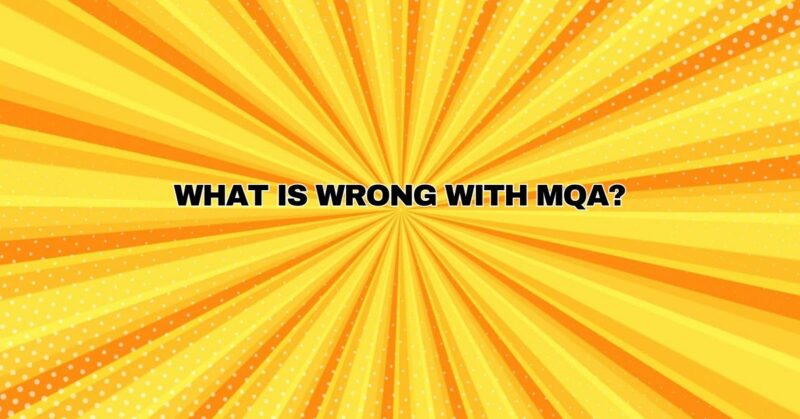MQA, or Master Quality Authenticated, is an audio technology that has generated significant interest and debate in the world of music and high-fidelity audio. Developed by MQA Ltd., this format promises to deliver studio-quality audio to listeners, preserving the integrity of the original recording. However, despite its claims and supporters, MQA has also faced several controversies and criticisms. In this article, we will explore what some of these issues are and why they have generated debate within the audiophile and music communities.
1. Proprietary Nature:
One of the primary criticisms of MQA is its proprietary nature. MQA is not an open-source or widely adopted format. It is controlled by a single company, MQA Ltd., which licenses the technology to hardware and software manufacturers. This exclusivity has raised concerns about accessibility and interoperability, as it limits the ability of consumers to freely use and distribute MQA-encoded content without specific hardware and software.
2. Lossy Core:
MQA employs a process known as “folding” to reduce high-resolution audio files into a smaller, more manageable size for streaming and downloading. Critics argue that this folding process introduces a form of lossy compression, which compromises audio quality. While MQA proponents contend that the core audio quality remains high, the folding process is a contentious point.
3. Equipment Requirements:
To fully experience MQA-encoded music, listeners need compatible hardware and software. This includes digital-to-analog converters (DACs), streaming devices, and music players that support MQA decoding. Critics argue that this requirement can be costly, potentially excluding those with limited budgets from enjoying MQA’s benefits.
4. Limited Music Library:
While MQA has been adopted by several major record labels, its catalog is still limited compared to other audio formats. Some music enthusiasts may find that their favorite artists or albums are not available in MQA, limiting their ability to enjoy the format.
5. Controversial Licensing Practices:
MQA Ltd.’s licensing practices have sparked controversy. Some manufacturers and streaming services have expressed concerns about the terms and conditions of MQA licensing agreements, including royalty fees and restrictions on how MQA can be implemented in their products. These disputes have led to certain manufacturers choosing not to adopt MQA.
6. Debates About Audibility:
The most significant debate surrounding MQA revolves around its perceived audio quality improvements. While proponents argue that MQA can provide a more authentic listening experience by preserving the original studio recording, others question whether the average listener can discern the difference between MQA and other high-quality audio formats, such as standard lossless FLAC or WAV files.
7. Alternative High-Resolution Formats:
MQA faces competition from other high-resolution audio formats, such as Direct Stream Digital (DSD) and traditional FLAC or WAV files. Some critics argue that these formats offer equally high audio quality without the complexities and controversies associated with MQA.
8. Lack of Transparency:
Critics have raised concerns about the lack of transparency regarding the MQA encoding process. Unlike open-source audio formats, where the encoding and decoding processes are fully documented and publicly accessible, MQA’s encoding process is proprietary, leading to questions about what happens during the folding and unfolding stages.
9. Debate Over Authentication:
MQA’s claims about verifying the authenticity of the original recording have sparked debate. Some argue that MQA’s authentication process is unnecessary, as many lossless audio formats already guarantee audio integrity. Others question the need for third-party verification in the first place.
Conclusion: The Ongoing MQA Debate
MQA, as a technology, has generated both enthusiasm and skepticism within the audio community. While it promises studio-quality audio and has garnered support from some record labels, hardware manufacturers, and streaming services, it is not without controversy and criticisms.
Ultimately, whether MQA is “wrong” or not depends on individual perspectives and priorities. Some audiophiles and music enthusiasts may appreciate the potential audio quality improvements offered by MQA, while others may prioritize open-source, widely accepted formats, or alternative high-resolution options.
As the audio industry continues to evolve, it is likely that the debate surrounding MQA will persist. Consumers, manufacturers, and music enthusiasts will need to weigh the advantages and disadvantages of MQA against their specific needs and preferences to determine whether it aligns with their vision of high-fidelity audio. In the end, the choice of audio format should be driven by an individual’s listening experience and the equipment they use, as well as their consideration of the format’s controversies and criticisms.


